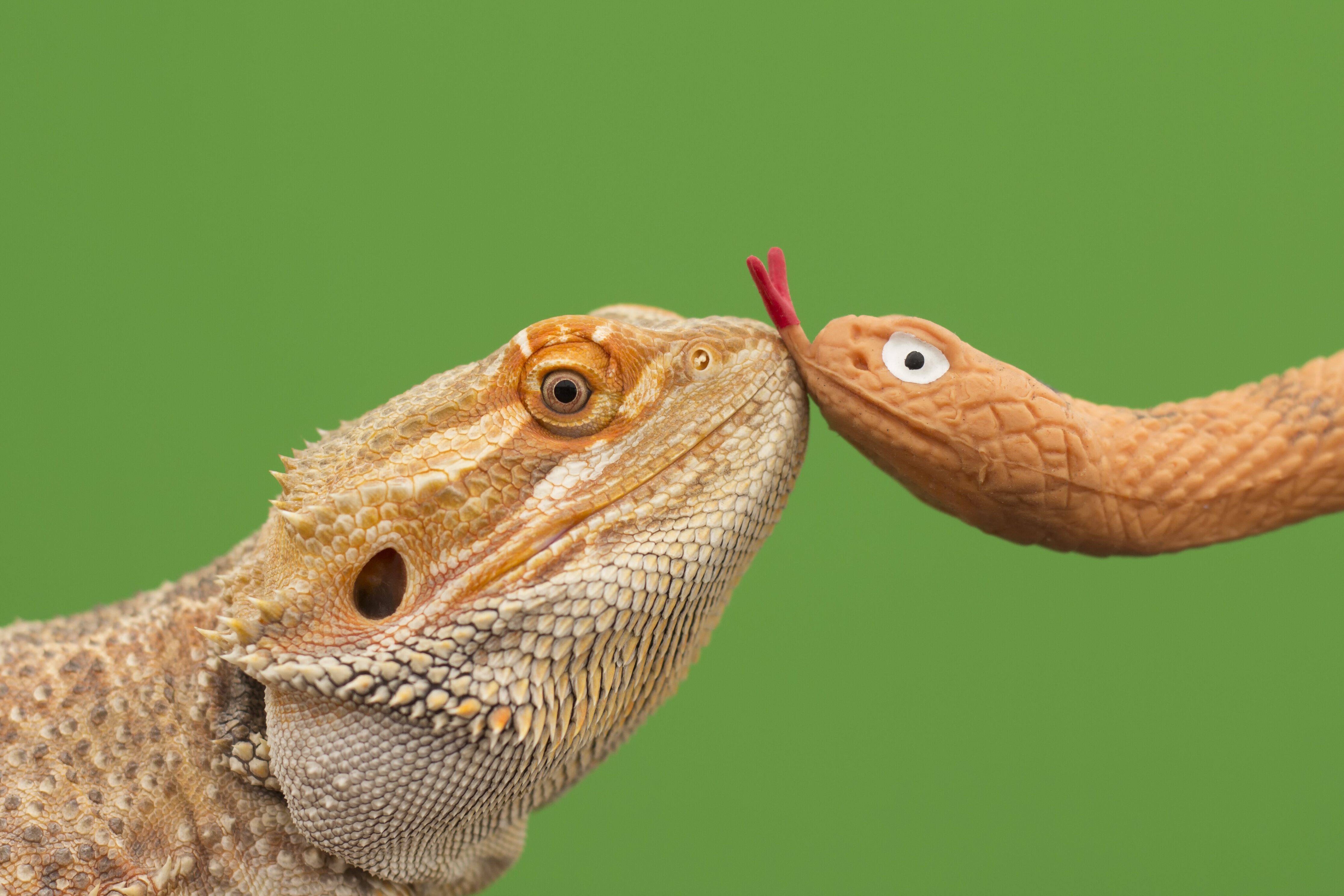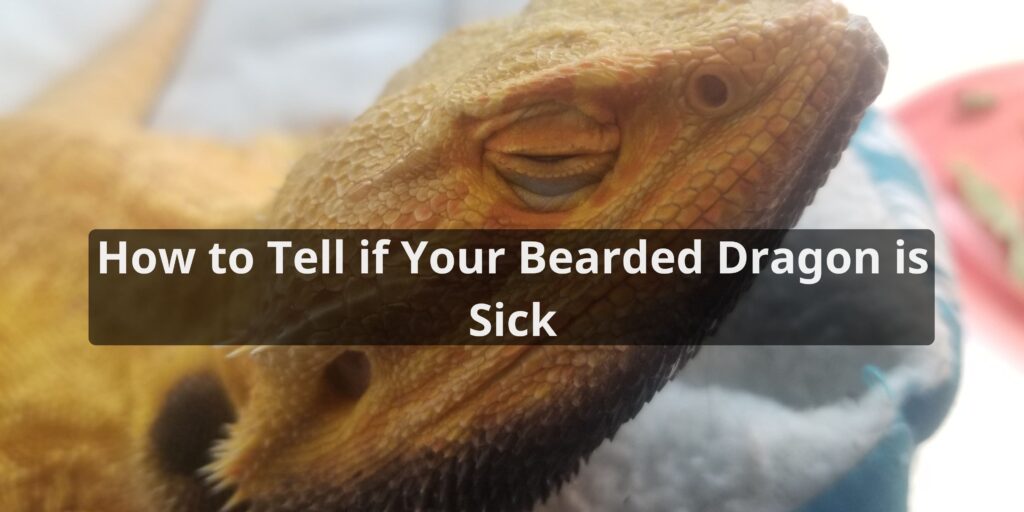Bearded dragons make great pets for reptile enthusiasts of all ages. They are relatively easy to care for and have delightful personalities. However, like any pet, bearded dragons can sometimes get sick. As a responsible pet owner, it’s important to monitor your bearded dragon and watch for any signs of illness. Here’s how to tell if your bearded dragon is sick and what to do about it.
Changes in Behavior

One of the first signs that a bearded dragon is unwell is a change in behavior. Healthy dragons are usually active and alert. They are eager to explore their habitat and readily come over to interact with their owner. If your bearded dragon is suddenly lethargic and not moving around much, it could be an indicator of illness. Other behavioral changes to watch for include:
- Lack of appetite
- Hiding more than usual
- Gaping mouth breathing
- Aggressive behavior or scratching at tank walls
If your once active and friendly dragon is now withdrawn and disinterested, something may be wrong. Carefully observe all behavioral shifts and make notes to share with an exotic vet.
Physical Symptoms
In addition to behavioral differences, there are several physical symptoms that can point to a health problem in a bearded dragon. Here are some to be on the lookout for:
Skin Changes: Healthy bearded dragon skin should be clean and smooth. Watch for any stuck shed, reddened skin, swellings, or presence of mucus. Also note any unusual spots, discoloration, or new lumps.
Eye Issues: Eyes should be clear and alert. Cloudiness, swelling, crustiness or discharge can indicate an issue.
Mouth Problems: Check for signs of infection like cheesy deposits in the mouth. Also look for retained shed skin in the mouth area.
Tail Injuries: Due to the fat storage in a bearded dragon’s tail, injury or abnormal thinning here is cause for concern.
Leg Weakness: Dragons use their legs to bask and hunt feeder insects. Leg twitching, rubbery legs, or an inability to grasp and climb may point to a problem.
Irregular Bowel Movements: Consistency of urates and feces can highlight internal issues. Runny, extremely odorous, or bloody stool is not normal.
Labored Breathing: Open mouth breathing, wheezing, and chest movements can signal a respiratory infection.
Any of these symptoms warrant a call to the vet. Catching problems early vastly improves the chances of successful treatment.
When to See an Exotic Veterinarian
So how do you know when to make that appointment with the exotic vet? Here are some clear signs your bearded dragon needs medical care:
- Not eating or drinking for over 2 days
- White, yellow, or bloody discharge from mouth or cloaca
- Twitching, tremors, or limb weakness
- Loss of balance or coordination
- Bony spine or sunken eyes, indicating weight loss
- Lethargic with no interest in stimuli
- Dark black beard for over a day
If your dragon displays any combination of these symptoms, it needs veterinary assessment right away. Even a single symptom that persists more than 48 hours is cause for concern.
At the Vet
When you take your sick dragon to the exotic vet, they will perform a physical exam and use diagnostic tests as needed. This may include:
- Palpating the abdomen
- Checking hydration and body condition
- Examining the eyes, skin, limbs, and mouth
- Fecal test to look for parasites
- Blood work to check values like white blood count
- Cultures to identify bacterial infections
- X-rays or ultrasounds of internal organs
Based on exam findings and test results, the vet will prescribe appropriate treatment. This may include fluids, antibiotics, antifungals, vitamins, or other medications. In severe cases, hospitalization with injectable drugs and assisted feeding may be necessary.
With the vet’s expert care and your attentive nursing at home, your sick dragon can make a full recovery. Be observant of symptoms, respond promptly, and follow all medical advice. With some TLC, you can have your happy healthy dragon back soon!
Caring for a Recovering Bearded Dragon
Once your bearded dragon has received veterinary treatment, the road to recovery begins. Nursing a sick dragon back to full health requires special care and patience. Here are some tips:
- House in a sterile, comfortable habitat between 80-85°F
- Gently bathe to keep skin and eyes clean of discharge
- Assist feed with an oral syringe if appetite is low
- Give medications as prescribed by exotic vet
- Mist tank several times a day to boost hydration
- Limit handling to reduce stress
- Use disposable tank liners for easy waste removal
The recovery timeframe will vary depending on the original illness severity. Follow up with the exotic vet until your dragon is fully back on its feet. With attentive home care and medical oversight, you can help your precious pet recuperate.
Preventing Future Bearded Dragon Illness

The best cure is prevention when it comes to pet health. There are several keys to keeping your bearded dragon disease-free in the long run:
- Annual wellness exams with the exotic vet
- Proper habitat setup with full spectrum lighting
- Maintaining ideal temperature and humidity
- A balanced, vitamin-rich diet
- Good hygiene with frequent tank cleaning
- Avoiding stressful situations like relocation
- Watching for signs of pain or illness and responding promptly
By being a responsible owner, you promote the longevity of your bearded dragon. Keeping “how to tell if your bearded dragon is sick” on your radar can help ensure your scaly friend lives a long and happy life.
Conclusion
Bearded dragons are one of the most popular lizard pets, but they can develop health issues just like any animal. As an owner, it’s up to you to monitor your dragon closely and watch for any behavioral or physical changes that might indicate illness. Acting quickly and getting exotic vet care for even minor symptoms gives your bearded dragon the best chance of treatment and recovery. With attentive husbandry and annual checkups, you’re sure to have a healthy dragon friend for years to come. Keep an eye out for the signs, respond promptly, and your beloved lizard will be back getting into mischief in no time.
FAQs About How to Tell if Your Bearded Dragon is Sick
What should I look for in their droppings to spot illness?
Healthy bearded dragon droppings should be well-formed, moist but not watery, and brown or dark in color. Any deviation, such as diarrhea, unusual color, or blood, can be a sign of illness.
Can changes in behavior signal illness in a bearded dragon?
Yes, changes in behavior can be a sign of illness. Bearded dragons that become unusually aggressive, hide excessively, or display erratic movements may be unwell and should be examined by a veterinarian.
Are there specific signs of respiratory issues in bearded dragons?
Signs of respiratory issues in bearded dragons include wheezing, labored breathing, nasal discharge, and open-mouth breathing. These symptoms may indicate a respiratory infection, which requires prompt veterinary attention.
What are common eye and skin issues in sick bearded dragons?
Common eye and skin issues in sick bearded dragons include swollen, sunken, or cloudy eyes, as well as skin discoloration, dryness, or sores. These can be signs of infections, nutritional deficiencies, or shedding problems.
Should I be concerned about lethargy in my bearded dragon?
Yes, lethargy is a concerning symptom in bearded dragons. While they may become less active during brumation or after laying eggs, prolonged or sudden lethargy can signal an underlying health issue that requires assessment by a veterinarian.
How can I differentiate between a minor issue and a serious illness in my bearded dragon?
If you notice any signs of illness in your bearded dragon, consult a reptile veterinarian. They can perform a thorough examination, diagnostics, and recommend appropriate treatment. It’s essential not to delay, as early intervention can be crucial in distinguishing between minor and serious health problems.



